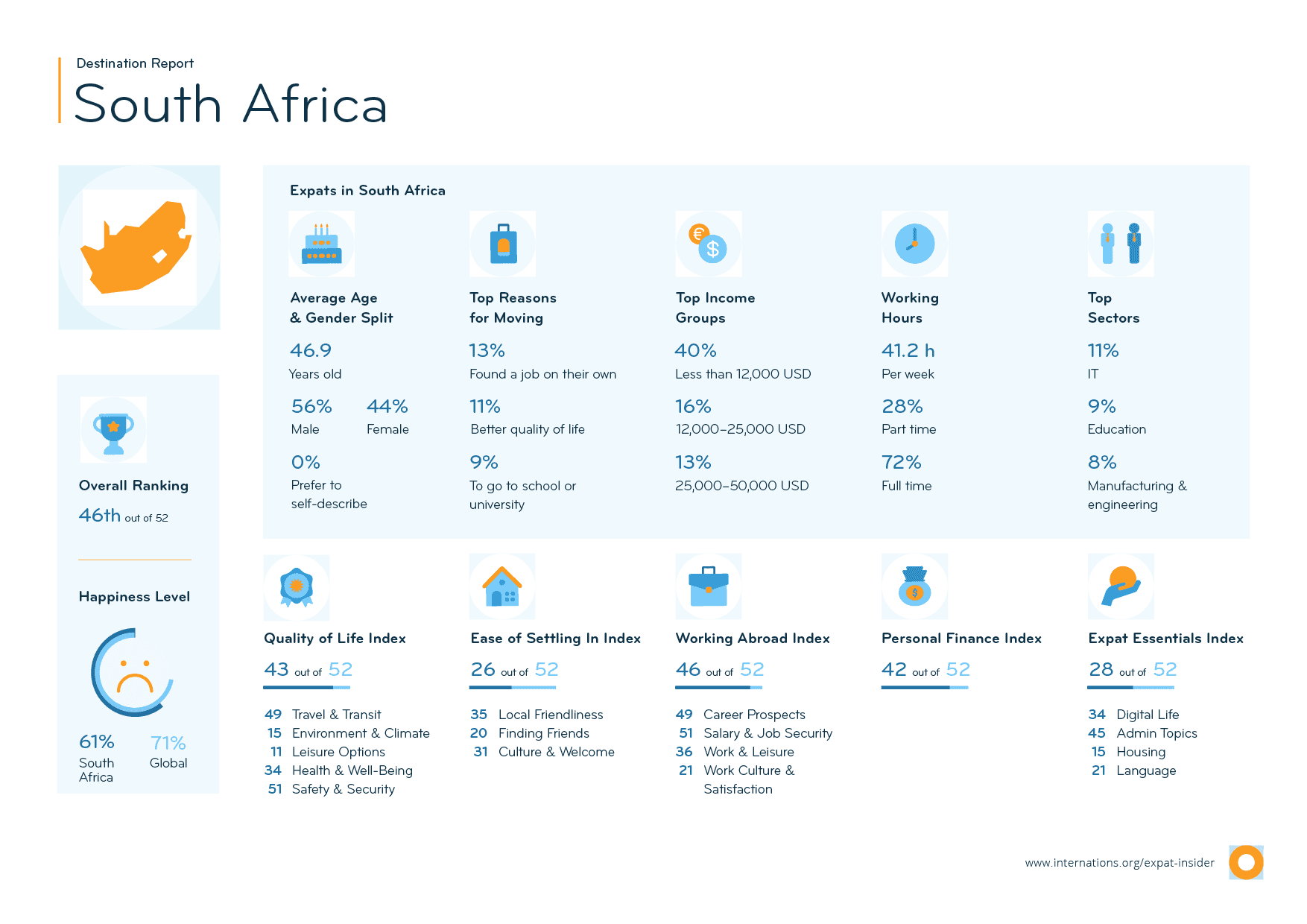Safety & Security Are Main Concerns for Expats in South Africa
Expats are particularly unhappy with the quality of life and working abroad in South Africa.
South Africa lands in 46th place out of 52 destinations in the Expat Insider 2022 survey. It ranks particularly low in the Quality of Life Index (43rd), which is mainly due to its poor performance in the Travel & Transit (49th) and Safety & Security (51st) Subcategories. It is even rated the worst destination worldwide for personal safety. Almost half the expats in South Africa (48%) feel unsafe, compared to just 9% globally.
The country also lands in the bottom 3 for political stability (51st), with 43% of expats rating this factor negatively, compared to just 15% globally. Only expats in Hong Kong (52nd) are less satisfied with the political stability there. Multiple expats express their fear of crime and the lack of political stability in South Africa. “Safety is the biggest problem,” says an expat from Iran, and an Irish expat shares that “crime, safety, inequality, and poverty” are his biggest concerns.
Close to half of expats (48%) also find it hard to get around on foot and/or by bicycle (vs. 13% globally), ranking South Africa last worldwide for this factor (52nd). It probably does not help that they are also unhappy with the affordability (25% vs. 15% globally) and the availability (42% vs. 17% globally) of public transportation.

A Fantastic Natural Environment
However, South Africa performs well in the Environment & Climate (15th) and Leisure Options (11th) Subcategories, providing a variety of culinary choices (8th) and plenty of opportunities for recreational sports (16th). More than four out of five expats (84%) are happy with the culinary variety and dining options, compared to 77% globally. What is more, more than nine in ten expats (91%) rate the natural environment positively (vs. 83% globally), and 78% are happy with the climate and weather (vs. 62% globally). “Great climate, great natural environment, and very good food,” summarizes an Italian expat.
A Worrying Job Market
The Working Abroad Index (46th) is another lowlight about expat life in South Africa. The country ranks among the bottom 3 in the Salary & Job Security (51st) and Career Prospects (49th) Subcategories. It is even ranked last for job security, with 36% of expats unhappy with this factor (vs. 20% globally). “The job situation is difficult. I am not working in my profession and the monthly income is not enough, but we are surviving,” says a German expat. In fact, close to half the expats (47%) are unhappy with the local job market (vs. 27% globally), and 28% find that they are not paid fairly for their work (vs. 20% globally).
On the bright side, South Africa ranks a lot better in the Work Culture & Satisfaction Subcategory (21st). The majority of expats (80%) sees a purpose in their work (vs. 78% globally), and 59% agree that the local business culture encourages creativity (vs. 51% globally). However, this is not enough to make them happy: one in four expats (25%) is generally unhappy with their job, compared to 16% globally.
Affordable Housing, but Tough Bureaucracy
In the Expat Essentials Index, South Africa ranks midfield (28th). It lands in 15th place in the Housing Subcategory: 46% of expats are happy with its affordability (vs. 39% globally), and 66% describe it as easy to find housing (vs. 52% globally). However, the country ranks 45th in the Admin Topics Subcategory. Expats found it hard to acquire a visa when moving to South Africa (45% unhappy vs. 24% globally), and more than half (54%) struggle when dealing with the bureaucracy/authorities in the country (vs. 39% globally).
Expats Enjoy Their Social Life
Lastly, South Africa performs best in the Ease of Settling In Index (26th). Expats are happy with their social life (59% vs. 56% globally) and find it easy to make local friends (46% vs. 42% globally). More than a quarter of expats (26%) are mainly friends with local residents (vs. 17% globally), and 56% describe their social circle as a fairly mixed group (vs. 49% globally). However, it seems like this is not the case for all of them: close to three in ten expats (29%) describe the local residents as unfriendly towards foreign residents (vs. 18% globally).
Further Reading
Advertisement
Join InterNations
The community for expats worldwide
Download

